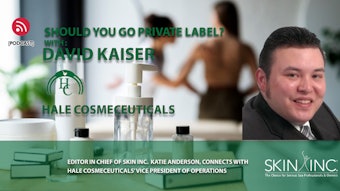During World War II, the American government ordered a 20% curtailment in cosmetic and nylon manufacturing to support the war effort. However, the beauty industry quickly counteracted these federally mandated sanctions that had the potential to cost them millions of dollars in lost revenues. Industry professionals very cleverly stepped up the promotion of lipstick, as well as leg makeup, and labeled their business-driving strategy a “wartime morale-booster.” Not only did these top cosmetic executives avert a financial catastrophe, they created a solution that served to rally support and filled women from coast-to-coast with an enormous sense of national pride.
Women who lived through this period, many of whom are now in their mid-80s or older, still maintain that drawing artificial nylon seams down the backs of their legs with grease lead cosmetic pencils in an attempt to replicate the appearance of nylon stocking seams was the least they felt they could do to show their support during wartime.
Borrowing trouble?
Although most people would rather not acknowledge it, history does have a way of repeating itself. What inevitable or unpredictable changes in the economy are in store for skin care professionals? If a sudden event were to occur and the result was a financial backlash that affected our livelihood, would today’s spa industry be as prepared to put another spin on it? Could it muster up the ingenuity to devise comparable solutions and perhaps even latch onto less obvious opportunities?
It is a well-accepted fact that the beauty business is more complicated today. Resourcefulness is essential to offset financial problems in an unstable economy. No one can dispute that unforeseen events can crop up without warning and diminish earnings. Most people are completely unprepared for lulls in the national financial system and have not calculated the possible cost of an abrupt interruption in fiscal flow to business. Monetary pressures, reduced work schedules and layoffs are an all-too common reality. It does not matter how successful a business is if the base of its operations suddenly is disturbed and business activities cannot be conducted as usual, or if clients begin to pull back on their spending.
When the economy slows down, its effects are felt in other ways, too. Oftentimes, it makes it harder to restock popular retail items, which decreases sales quotas or reduces overall profitability. Certain products become increasingly difficult to find. Without warning, suppliers—after an in-depth cost-benefit analysis—discontinue what they see as poor sellers.
It is impossible to plan for every unanticipated event that could have a negative impact on business. However, it’s wise to have some idea of what to be aware of, as well as the appropriate countermeasures needed to combat economic downturns.
No real assurances
Less than a decade ago, the idea of conjuring up countermeasures to cushion the effects of a depressed economy brought about by the financial repercussions associated with the aftermath of natural disasters, terrorist attacks or the closure of commercial conglomerates was an obscure concept and only a consideration of industry doomsayers.
However, in order to be financially successful today, one must be able to look at other economic factors that can have a major effect on the industry’s economy. Who could have guessed that lasers would have had such a negative impact on the field of electrology? Very few professionals, even now, are aware of medical spa franchises and the influence they are exerting on the future profitability of traditional skin care enterprises. Those once blindsided by their steadfast belief that the spa industry would remain unscathed by the billions of dollars spent on the research and development of pharmaceutically based preparations now respectfully give credence to the impact of a downturn in consumer spending for nonmedical-grade procedures in these facilities.
Nowadays, no one goes about deriving a livelihood in the esthetic field—or any profession, for that matter—without incident. Industry veterans are sharing clients with physicians, nurse practitioners, registered nurses, licensed practical nurses, physician’s assistants and other medically related skin care providers. This industry is seeing nurses replace estheticians and estheticians replace medical assistants.
The Internet has made experts out of all clients. With the click of a mouse, they can read all about professional treatments and the minutest of details involved. They even can rate our performance, object to it or, worse, locate a competitor within seconds.
It takes boldness and vision to make it in the present and in the future of the ever-evolving esthetic marketplace. It is interdependent on an enormous consumer appetite for new technology, innovative products and state-of-the-art skin care equipment to meet the needs of so many diverse cosmetic consumers—costing spas thousands of dollars annually in lost revenue.
Troubleshooting can fail
Although there is no fail-safe formula for navigating through a plummeting financial period, those who have dodged the bullet on more than one occasion have done so mainly because they have prepared in advance for different levels of economic calamities. (See Fifteen Intangible Business and Career Drivers.)
One size doesn’t fit all
No single blueprint will work for everyone. When the economy shifts, confusion results. Learn to rely on your intellect and instincts during troubling times. No one solution fits every situation. Stay on top of economic trends in order to take control with the lead time you have, and devise various strategies. Just think about this for a moment. There is a lot of revenue to be made in the beauty industry, regardless of how the economy is affected. It is a profession that generates billions of dollars, even in financially compromised periods. There always are incredible opportunities to make money and boost earning potential if you just open yourself up to recognizing how you can provide a service differently in order to make it more exciting.
Remember, worry stifles creativity and prevents you from thinking up stopgap measures that can severely influence your bottom line. You must remain calm and keep your wits about you at all times so that you will be ultrasensitive to significant shifts in consumer spending habits.










